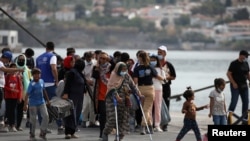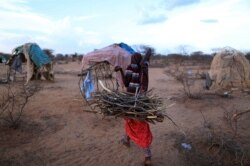European officials fear the coronavirus pandemic will spark eventually another massive migration wave from Africa and the Middle East. “The social and economic consequences of COVID are going to get worse and that will mean more people deciding to search for a better life,” Malta’s foreign minister warned last week.
Evarist Bartolo is urging European countries to invest more in African countries to help boost their economies to generate wealth and jobs so people are less likely to migrate.
He points out that about two-thirds of asylum-seekers are economic migrants, not war refugees. Pandemic-shattered economies in sub-Sahara Africa will fuel migration in the future, he fears.
The coronavirus pandemic is acting currently as a dampener on migration, analysts say. The U.N.’s International Organization for Migration, IOM, reports approximately 50,000 migrants have arrived this year so far to Europe, largely by sea — considerably fewer than in previous years. The IOM reported that 110,669 migrants and refugees entered Europe by sea in 2019. At the height of the migration crisis more than a million migrants entered the EU, according to the United Nations.
Even before the pandemic unfolded, numbers of migrants and refugees were decreasing dramatically, first falling off in 2016 after the European Union clinched a deal with Turkey to disrupt migrant routes into Europe via Turkey and subsequently also because of increased interceptions at sea and deals with the Libyan coast guards to keep migrants from making it to Europe.
The pandemic is making movement even harder, say analysts.
But once the pandemic has been curbed, the economic reckoning of the coronavirus is likely to boost migration.
Evarist Bartolo told a British broadcaster last week that Europe has to do much more to persuade people to stay in their own countries. “We need a new relationship with African countries so we can help to create wealth where they are, they do not risk their lives trying to get to Europe,” he said.
Aid is not the answer
But some development economists are warning that development aid is not a short-term solution to migration. A handful of new studies suggest neither aid nor economic development does much to deter migration, at least in the short to medium term, and they cast doubt whether higher incomes for the poor in origin countries will deter migration, at least for some time.
Research by the Center for Global Development, a nonprofit think tank based both in Washington and London, analyzes the relationship between real gross domestic product, per capita and net emigration rates in developing countries. And it suggests emigration rises along with rising incomes at first, only falling later as much higher incomes are achieved. Rising incomes for relatively poor countries or people do not immediately deter migration, authors Michael Clemens and Mariapia Mendola say.
Many migrants are not among the world’s poorest, the research suggests. In low-income countries, people actively preparing to emigrate have 30% higher incomes than others overall. Their findings suggest that economic growth in a developing country can raise the number of migrants, rather than reducing it. The poorest are without the means to pay traffickers or fund migration bids and those with better resources see migration as something akin to going to university, a likely good investment.
Clemens in a separate paper also found that as poor countries get richer, emigration rises. It starts reversing when annual income per head reaches $10,000 per person. “Successful, sustained economic growth in the low-income countries is therefore likely to raise the emigration rate, at least in the short-term. As incomes rise, so too does people’s ability to afford the investments that make migration easier,” according to Clemens.
“The world’s poorest are not the ones who migrate,” says Mariapia Mendola, a professor of economics the Università degli Studi di Milano Bicocca. “Migration is seen as an investment, just like higher education. You wouldn’t decide not to send your kids to college just because your family is getting wealthier. Similarly, families are not deciding to stay put as their incomes rise. Migration changes lives and economies for the better,” she adds.
Neither researcher is arguing foreign and development aid should be cut off. Says Clemens: “That would be unwise. Economic development overseas is in everyone's long-term interest. It helps other countries prevent humanitarian disasters, fight pandemic disease, remain stable, and engage with the world economy. Perversely encouraging poverty, out of a misplaced fear of migration, is a road to nowhere.”
But development aid cannot serve as a short to medium-term panacea to illegal migration. Recent research by other development economists suggests that if aid is given just with any eye to deterring migration in the short term, it would be highly costly. British academics Paul Clist and Gabriele Restelli estimates that Italy would have to spend around $1.8 million in bilateral aid for each migrant deterred from trying to enter the country.








